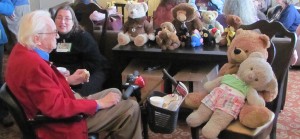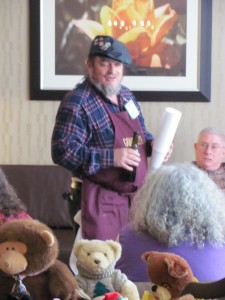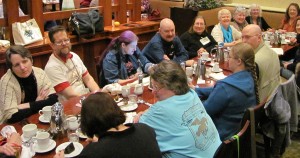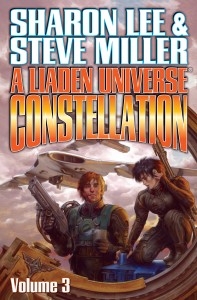The third of my three panels at PhilCon was entitled “Separating the Author from the Work,” and it took place at 10 a.m. on Sunday, in Plaza V, up on the Mezzanine floor, which was not the largest venue in the house. It was, however, full, which, given the day and the hour, points to. . .rather a lot of interest in this topic.
My co-panelists were Ian Randall Strock, Peter Prellwitz, Oz Drummond, and Muriel Hykes, our fearless moderator.
The panelists quickly found out why there was so much interest in this topic.
It was because the topic was So Broad.
Muriel, for instance, wanted to talk about authors/actors behaving badly, which is to say, people who don’t know when not to say something, people who, as one of the members of the audience put it, “need handlers.”
Oz wanted to talk about the whole Requires Hate scandal (if you, like me, are out of the loop on the scandal, details and what I’m assured is a balanced accounting may be had from Laura Mixon. Here’s a link to the PDF file. )
Ian, who had done a similar panel at Arisia, and had been blindsided by the opinions of his fellow panelists, had come ready to address those views.
I wanted to talk about the misconceptions non-writers have about the writing process that apparently leads them to believe that everything a fiction author writes about faithfully reflect that author’s beliefs, and about the disgraceful behavior surrounding this year’s Hugo ballot (by which I do not mean the Sad Puppy Campaign, though I have and had certain philosophical problems with it, but do mean the crying and wailing and gnashing of teeth by those who felt it was acceptable to publicly vilify their ballot-mates for “ruining” “their” ballot).
(I’m not leaving Peter out, but, if he came in with an agenda, it was not obvious to me. His remarks during the course of our conversation led me to believe that he felt writers ought not to be interfered with in their work, or pre-emptively censored on Certain Topics; and that it was perfectly possible for Bad People to create Good Art.)
Members of audience wanted to talk about other things, still, including the alleged behavior Walter Breen, and the alleged involvement of Marian Zimmer Bradley, and All Of Sixties Fandom, in those behaviors; the need for warning labels on books; and the belief that an author’s culture and the prevailing beliefs and/or mores of the time are no excuse for said author to have had, and expressed in their fiction, what we now know to be Bad Thoughts.
No wonder the room was full, right?
I’m not going to recap the whole thing — for the very good reason that I can’t remember it all — but I am going to talk about a couple of things that interest — and concern — me, as a writer, and as a reader.
One of those is this idea of warning labels on books so that readers don’t get “hurt” by the content of the books. I am on record in several places (including at this panel) as believing that this as idiotic a notion as I ever heard. Do we get warning labels in Real Life? We do not. Insofar as fiction is “practice” for Real Life, warning labels defuse the efficacy of the practice.
I also have some very real problems with the idea that we can be “hurt” — that we can take actual harm — from the people/situations/ideas we find in books. Books have a wonderful safety program built into them. Have you just read something that makes you uneasy?
YOU CAN SHUT THE BOOK.
Yes. You can shut the book. You can put it down. You have the option of never picking it up again. You have the option of going for a walk and thinking about The Thing That Upset You, coming to terms, and picking the book back up. Real Life is not safe; ideas are not safe; the whole world does not necessarily agree with you (or with me), but books offer you that vital safety valve that Real Life never does — you can close the covers and take a breather.
The particular need for a warning label that came up in the panel was one of the Peter Wimsey novels, which has much to do with people who are Jewish. The assertion from the audience member was that the book needed a warning label, because all the rest of the Wimsey books were perfectly enjoyable, these Bad Thoughts were particularly hurtful to the reader.
Needless to say, this assertion baffles me. I can’t begin to count the number of ghastly, hateful, vicious, stupid, and just plain wrong portrayals of women that I’ve read in my reading career. Did they “hurt” me? Did I think the author was specifically and personally talking about me? No, I did not. Now, they may have hurt you, my readers, because I determined to get it right, when I started writing. Of course, I also decided not to write men as testosterone-drunk thugs who only know how to screw and destroy, too, so that could just be me.
Along with the warning labels was Ian’s description of the Arisia panel, in which his co-panelists apparently said that some books — by Robert Heinlein and HP Lovecraft, for instance — ought not to be read by right-thinking people. Because the authors are contemptible.
Not the work of the authors.
The authors, themselves.
Which is pretty scary, all things considered.
One of the reasons I read — and write — science fiction is that, given that all fiction is practice for Real Life; science fiction is practice for the future. In science fiction, we’ve created a safe place where we can lay out the moral dilemmas of the future, and let them unravel. We can say, for instance, “OK, we want everybody to be SAFE? Let’s look at (one way) having an utterly safe world might play out.” We can do this — and things like this — because we’re telling a story. We’re not preaching a sermon; we’re playing a game of Let’s Pretend.
I said as much, and Ian agreed that this was also why he read science fiction, but that, in his opinion, his co-panelists at Arisia wanted, not experimentation, not What-If, but validation of their own belief system. They didn’t want to entertain a variant viewpoint, and found variant viewpoints to be wrong, and unworthy of being read.
(Which begs the whole question of how do you know something’s unworthy of being read unless you read it, but I’ve already got ‘way too much on my plate, here, so we’ll leave that one for the moment.)
Around about here someone from the audience asked the question about “leakage.” Which is to say, if the author, in their private life, habitually has Bad Thoughts, how do they insure that such thoughts do not leak over into their fiction?
Now, the true and sincere answer to this is — you probably can’t. If you’ve built a world — like the Liaden Univese®, let’s say, that has its rules firmly in place — then your worldbuilding is going keep out a lot of leakage. Most authors that I know try to tell a True Story, by which I mean a story that is in keeping with the characters and the world they’ve created.
But there’s another facet of this “leakage” that no one ever talks about. Readers who want to complain about Bad Authors having Bad Thoughts and putting those Bad Thoughts into their fiction, are missing exactly half of the contract between the reader and the writer.
See, while every book has a writer, who comes complete with a past, and a society, and experiences, and thoughts, some bad, some good, some boring and venal. . .
While every book has a writer, every book also has a reader.
And every reader comes complete with a past, and a society, and thoughts, and experiences, and expectations.
I write a book; I hand it to you. You read the book.
We have, between us, interacted with two different books, not only because our relationships to the work — creator and consumer — are different, but because we, as people, are different.
If there are Bad Things in your book, the writer may (may) not have put them there.
If there are Bad Things in your book, the author may have done that on purpose. It may be an intellectual exercise. It might not be, but here’s the key — just because someone has presented an idea, you are not forced to accept it. It will, yes, become part of your life’s experience, but that’s not necessarily a bad thing. Being able to think a wide range of thoughts can only be a good thing, right?
And, honestly, the same person — reader, writer, taxi cab driver — is, by virtue of being human, Perfectly Capable of having Bad Thoughts, Good Thoughts, Mediocre Thoughts, and Thoughts that Make No Sense. Simultaneously. This is why, in a perfect universe, we bounce ideas off of each other.
This is why, in a perfect universe, we read and write science fiction.
This is why we read books even if we suspect they may not be very good books, or if, perhaps, they may contain Bad Thoughts. A bad book may, for instance, contain a single transcendent scene that alters the way you think about that thing that happened to you in sixth grade that makes it important to you and your life.
Human beings are complex; our thoughts and our hearts and our works are also complex.
That’s a feature, not a bug.
——————–
Time is the Simplest Thing, by Clifford Simak, appears to be available as an ebook (amazon ) and also as a used mmp. If you’ve never read this, I suggest that you do so. NOTE: I have no idea what sort of person Clifford Simak was, what his politics may have been, or if he ever had a Bad Thought. Certainly, however, given one of themes of this story, he Knew About Thoughts, and Tools, and Hearts, and Complexity.



